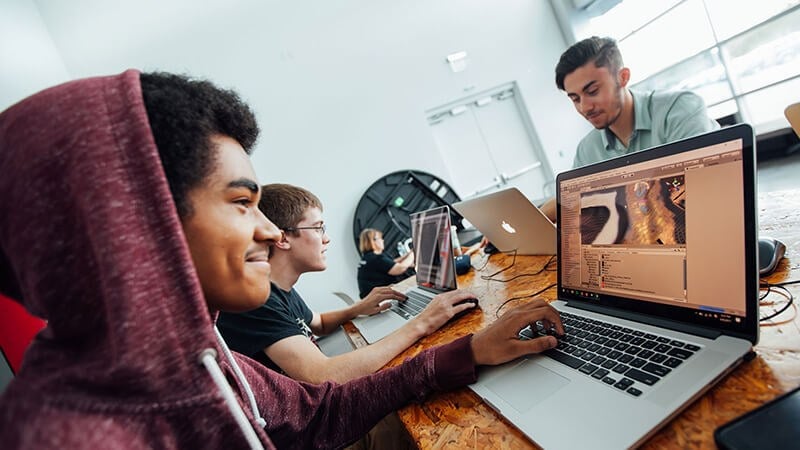Full Sail
Full Sail’s Game Design Master’s Program Helps Students Build a Resume Based on Their Strengths
Learn it today, act on it tomorrow. In just 12 months, Full Sail's Game Design master's program can help you expand your professional skills.
Breaking into the gaming industry can be tough, especially for those looking to pursue mid-level design, user experience, research, or leadership roles. In an industry built on competition, how do you make yourself stand out? Full Sail's Game Design master's degree provides students with practical experience to prepare them for a fast-paced industry.
"Our program is built for two kinds of people," says program director Rob Catto. "The first is someone right out of a game design or development undergraduate program looking to specialize in game design, game production, or user experience research. The second is someone who has been working in the industry and wants to do something different. In both cases, we look at a person's strengths to determine their path in the industry."
New students begin with a course in game design, before moving on to foundational courses in the areas of design, production, and user experience. In those early months, they'll learn game design perspectives and techniques, as well as user experience methodologies and leadership strategies. They'll also work closely with faculty to determine an area of specialization.
Students begin their capstone track in month five, building around one of five areas of focus: indie games, serious games, virtual and augmented reality, production, or user experience. From there, they'll begin work on their capstone practicum – working in their area of specialization.
For instance, on-campus students who decide to take the user experience route will have access to Full Sail's User Experience Lab. There, they'll work with actual game studios and indie designers to conduct research and provide feedback for improved gameplay. Campus students in the production track will act as producers, leading teams of undergrads through the game development process. And students in the indie and serious games tracks work to build games from the ground up, working as producers, designers, programmers, artists, and more based on their existing skillset. Due to the real-world nature of the capstone project, students build their portfolio as they go – balancing traditional coursework with graduate-level job training.
"Additionally, we have our students conduct research on an industry topic of their choosing, which they can use to create a paper to submit for publication. At the end of the program, they'll produce a conference-style presentation that showcases their ability to distill what they've learned in the course of their research," says Rob. These materials form a portfolio that new grads can show to potential employers.
"This degree is about growth," adds Rob. "We're training students to evaluate their strengths and build on those skills to set and achieve goals within the industry."
Whether you’re ready to apply or just want to learn more about Full Sail University, our Admissions Representatives are here to help. Call us or request more information.
